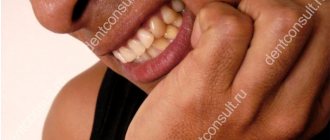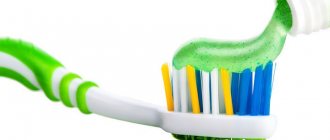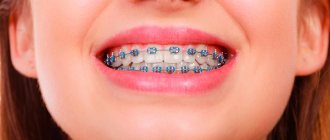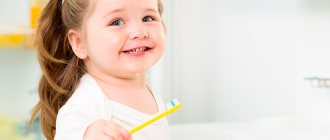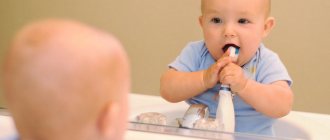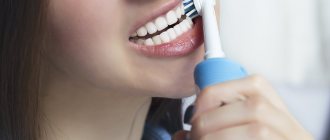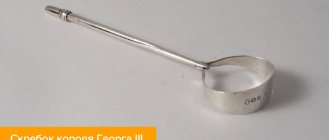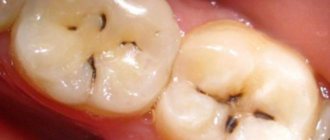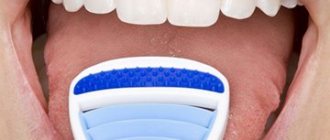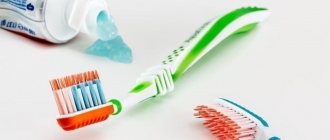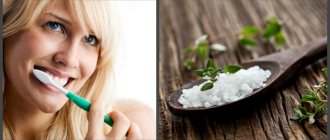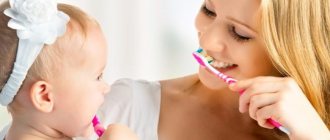Why brush your teeth?
One of the dirtiest places in our body is the oral cavity. This is due to high humidity and food intake - good conditions for the proliferation of hundreds of microorganisms. Our defense mechanisms cope with pathogenic and opportunistic microflora, and the oral cavity remains healthy. We help our own immunity by taking care of our oral cavity.
If you don't brush your teeth for a long time or do it incorrectly, bacteria multiply faster. A soft bacterial plaque forms. Microorganisms secrete a large amount of acids that destroy the enamel - this is how caries appears.
The soft plaque gradually mineralizes, and it becomes impossible to remove it with a toothbrush. Tartar appears - dense formations are usually located near the cervical area of the teeth, between the teeth, on the inside of the incisors. The presence of tartar increases the risk of developing various oral diseases:
- the sharp edges of hard plaque injure the gums, which causes inflammatory gum diseases - gingivitis, periodontitis;
- the formation of subgingival stone leads to periodontal disease - the gum literally peels off from the surface of the tooth, forming a periodontal pocket;
- The proliferation of bacteria leads to halitosis, an unpleasant odor from the mouth that cannot be eliminated with perfumed mouthwashes.
Plaque, food particles remaining between the teeth, increase the chances of developing caries and increase the risk of complications: pulpitis, periodontitis, cysts, granulomas, etc. Information on how to clean your teeth will help prevent many diseases.
Ask a Question
In the dictionary Complete accentuated paradigm according to A. A. Zaliznya
clean, clean, clean, clean, clean, clean, clean, clean, cleaning, cleaned, cleaned, cleaned, cleaned, clean, clean, clean, clean, cleaning, cleaning, chi cleaning, cleaning, cleaning, cleaning, cleaning, cleaning, cleaning, cleaning, cleaning, cleaning, cleaning, cleaning, cleaning, cleaning, cleaning, cleaning, cleaning, cleaning, cleaning, cleaning, cleaning, cleaning, cleaning, chi cleaning, cleaning, cleaning, cleaning, cleaning, cleaning, cleaning, cleaning, cleaning, cleaned, cleaned, cleaned, cleaned, cleaned, cleaned, cleaned, cleaned, cleaned, cleaned, cleaned, cleaned, cleaned, cleaned, cleaned, cleaned, cleaned, cleaned lice, cleaned, cleaned, cleaned, cleaned, cleaned, cleaned, cleaned, cleaning, being cleaned, being cleaned, being cleaned, being cleaned, being cleaned, being cleaned, being cleaned, being cleaned, being cleaned, being cleaned, being cleaned, being cleaned, being cleaned, being cleaned, being cleaned, being cleaned, being cleaned, being cleaned, being cleaned, being cleaned, being cleaned, being cleaned, being cleaned, being cleaned, being cleaned, being cleaned, being cleaned, being cleaned, being cleaned, being cleaned, being cleaned, being cleaned, being cleaned, being cleaned, being cleaned, being cleaned, being cleaned, being cleaned, being cleaned, cleanable, being cleaned, being cleaned, being cleaned, being cleaned, being cleaned, being cleaned, being cleaned, being cleaned, being cleaned, being cleaned, being cleaned, being cleaned, being cleaned, being cleaned, being cleaned, being cleaned, being cleaned, being cleaned, being cleaned, being cleaned, being cleaned, being cleaned, being cleaned, being cleaned , being cleaned, being cleaned, being cleaned, being cleaned, being cleaned, cleaned, cleaned, cleaned, cleaned, cleaned, peeled, peeled, peeled, peeled, peeled, peeled, peeled, peeled, peeled, peeled, peeled, peeled, peeled, peeled, peeled, peeled, peeled, peeled, peeled no, cleaned, cleaned, cleaned, cleaned, cleaned, cleaned, cleaned, cleaned, cleaned, cleaned, cleaned, cleaned, cleaned, cleaned
Share the meaning of the word:
How to brush your teeth correctly?
You need to brush your teeth twice a day: in the morning and before bed. Doctors recommend spending at least three minutes on each hygiene procedure. Sweeping movements should be directed from the gums to the edge of the crown. You should not move the brush up and down without lifting it from the surface of your teeth.
In addition to cleaning the surfaces of the teeth with a brush, you need to pay attention to the condition of the interdental spaces. Food debris gets stuck in them and plaque forms faster. Using dental floss will help remove them. The floss is carefully inserted between the teeth, leaving behind soft plaque and food debris. You also need to pay attention to the surface of the tongue and the inner surface of the cheeks - many models of brushes have an element on the back side for cleansing the mucous membranes.
You need to finish brushing your teeth with a mouthwash: you can make the solution yourself or buy it at a pharmacy. Without indications, it is better not to use antiseptics, alcohol-based or chlorhexidine-based products; a regular product for daily hygiene is sufficient. You need to rinse your mouth for about 30 seconds.
It is important to brush your teeth after every meal. Cleaning them during the day can be problematic, so people with a healthy oral cavity can use chewing gum: chew it for no more than five minutes and only after eating. Everyone else needs to use mouth rinses.
Even strict adherence to the rules of brushing your teeth does not guarantee impeccable cleanliness. Removal of pigmented plaque and tartar is carried out in a dental office. Two visits per year to a dental hygienist are usually sufficient. If plaque forms faster, you wear braces or other dental structures, it is advisable to undergo professional cleaning up to 3 times a year.
In Ozhegov's dictionary
CLEAN, clean, clean; cleaned; nesov. 1. someone or something. Removing dirt, whatever. layering, make clean. Ch. dress, shoes, dishes. Part of the horse, part of the teeth. Bird cleaning its feathers. 2. what. When preparing food, remove peels, scales, shells, seeds (in 2 digits) from vegetables, fish, berries, mushrooms. 3. what. Free from something. accumulated, polluting. Ch. garden, paths, pond. 4. what. Remove (what clogs, pollutes, clutters). There is snow on the tracks. Ch. Dirt from shoes. Ch. rubble. 5. someone or something. Rob, rob (simple). Ch. cash register. || owls clean, - looking, - clean; -sought (to 1 and 3 meanings), purify, -searching, -istish; -searched (to 2, 3 and 5 meanings) and clean, -searching, -istish; -searched (to 1, 2 and 3 values). 1G noun cleaning, -i, g. (to 1, 2, 3 and 4 values), chnshchenie, -i, cf. (to 1 and 2 values) and cleaning, -i, g. (to 2 and 4 values). || adj. cleansing, -th, -oe (to the 1st and 4th stages; special).
How to use thread?
We devoted a separate section to the use of dental floss, or floss, since many patients ignore this hygiene product or do not know how to use it correctly.
You need to take a thread about 45 cm long and wind most of it around your middle fingers. To clean, it is enough to leave a thread 2-3 cm long. Holding the thread between your thumbs and forefingers, carefully place it between your teeth and move it up and down. Then pay attention to the base of the tooth, making sure that the thread penetrates under the cervical part of the gum. Movements must be gentle to prevent damage to the gums. To remove the thread, lift it and move it back and forth.
Use a clean section of floss as you move from tooth to tooth. For the second jaw you need to take a new thread.
In Efremova's dictionary
Emphasis: cleanse the nes. trans.
- Remove dust, dirt, etc. from something, to make clean; cleanse
- Apply gloss by polishing until shiny.
- To free from unnecessary, superfluous, preparing for smth.
- trans. decomposition To subject to examination in order to liberate or free oneself from harmful, unnecessary, alien elements, to separate the healthy from the unfit.
- To remove, cut off the peel, skin, scales from something. (fruits, vegetables, fish, etc.).
- Release fruits, grains, etc. from seeds, stems, litter.
How to choose pasta?
Toothpaste is selected individually depending on the condition of the oral cavity and existing problems. For people with increased tooth sensitivity, there are special toothpastes that reduce hyperesthesia. The components of the product “seal” the dentinal tubules and help reduce dental reactions.
Pastes with antibacterial components may be suitable for people who quickly develop plaque and recur inflammatory tissue diseases.
If your gums are bleeding, your choice may be a paste with ingredients that strengthen soft tissue.
It is important to pay attention to the mineral composition of the product: the presence of fluoride, calcium, magnesium, etc. This is especially true for people with demineralized enamel. It is better to consult a doctor to choose the right paste.
Many people strive to make their teeth enamel lighter and choose whitening toothpastes. Some of them contain enzymes that help remove plaque easily. This does not directly affect the color of the tooth, but removing plaque allows you to “expose” the enamel, visually it will look lighter. Such pastes are relatively harmless, but it is better to use them no longer than 4-8 weeks.
The second group of whitening pastes are highly abrasive: they contain large abrasive particles that are designed to remove pigmented plaque. You cannot use them constantly: this can cause micro-scratches of the enamel and increase the risk of tooth destruction by caries. To obtain the desired effect without harm to health, it is enough to use the paste 1-2 times a week.
How to choose a regular brush?
The choice of toothbrush should be agreed with the dentist. Brushes are divided into three types depending on the degree of stiffness of the bristles: soft, medium and hard.
Soft ones are used for diseases of periodontal tissues and mucous membranes of the oral cavity: gingivitis, stomatitis, candidiasis, periodontitis, glossitis, bleeding gums of unknown origin, etc. Usually this is a temporary measure so as not to injure the tissues during acute inflammation. Soft bristles cannot fully cope with cleansing. Such brushes are used on an ongoing basis by patients with pathologies, underdevelopment of enamel, as well as second and third degree periodontal disease.
Brushes with medium bristles are recommended for most patients. They can be used in the presence of orthopedic structures, implants, fillings, veneers. It does a good job of removing soft plaque and food debris.
Hard bristles can damage the enamel and delicate tissues of the mucous membranes and gums. Its use has a number of indications. The dentist may recommend this brush to smokers and coffee and black tea drinkers. It is also advisable to use it in cases where plaque forms quickly. However, there are several conditions that allow you to use a hard brush: the enamel must be strong, of normal thickness, and the gums must be strong, without signs of disease.
There are also special brushes: super-hard ones for bridges and removable structures, brushes for patients with braces, etc. The doctor will select a brush taking into account individual characteristics.
Brushing your teeth with an electric brush
Electric toothbrushes vibrate and/or rotate to effectively remove plaque and provide a cleaner mouth. If you are wondering what is better to brush your teeth - a regular or an electric brush - then you should give preference to the latter.
But it is important to strictly follow the cleaning rules so that the daily hygiene procedure is effective and safe. We have prepared a small instruction:
- squeeze the paste onto the brush and press the power button;
- hold the brush at a 45 degree angle;
- Move the brush along the front surface of your teeth, pausing for a few seconds on each one. Typically the head size is sufficient to clean one tooth;
- repeat the manipulations along the inner surface of the teeth;
- complete the procedure by cleaning the chewing surfaces of the teeth.
Important: there is no need to put extra effort or pressure on the brush. Direct it, and the movable head will handle the task itself. Some models of electric brushes are equipped with pressure sensors and will warn you if there is excessive pressure.
In the Dictionary of Synonyms
clean, clear, clear, sweep, brighten, scrape, wash, wash, rinse; filter, strain, settle, reduce (remove) stains; cleanse the Augean stables; to polish, to polish, to polish, to peel, to scold, to peel, to knock out, to scrape, to clear, to scrape out, to scratch, to scold abusively, to scold in the last words, to bastard, to clean off, to scold, to re-clean, to clean up, to wash, to brighten, to polish, to peel, to scold on what is worth, beat, tear, bone, peel, wax, shower with abuse, shower with curses, scrape, wipe, send away, call names, remove, remove, hit, scold, rob, lick, clean, scratch, lick, poke, cover , peel, rob, honor, peel, bake, cover, cleanse. Ant. pollute, pollute
